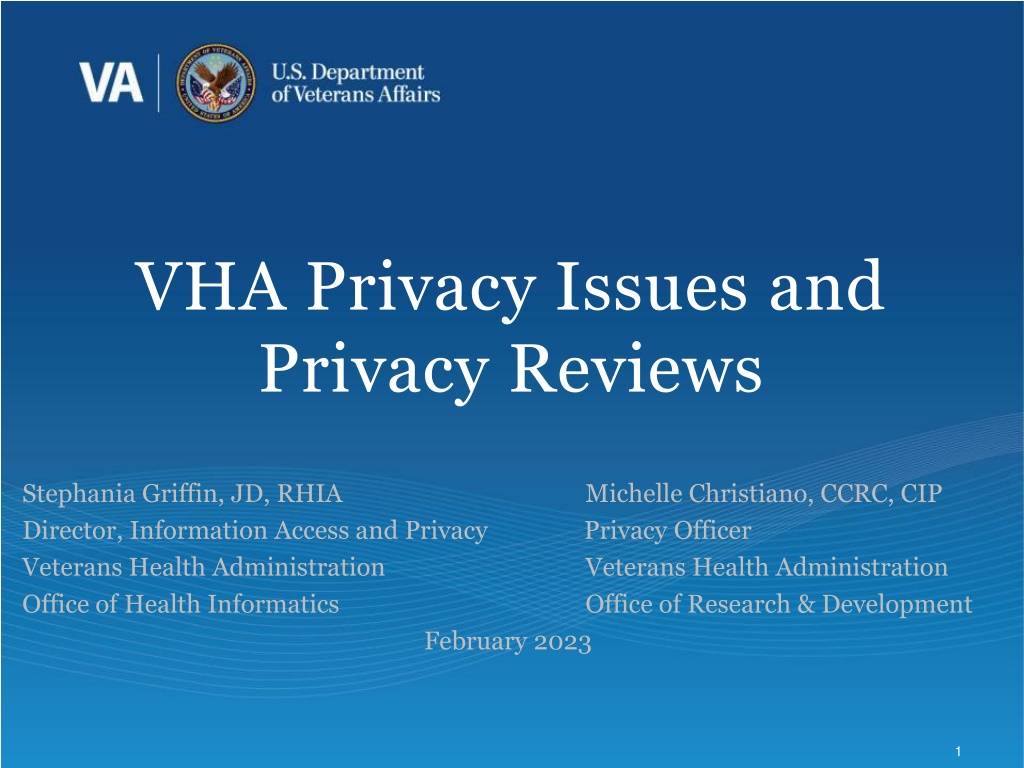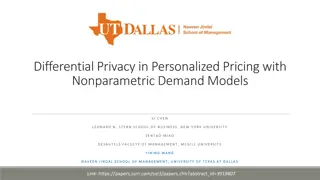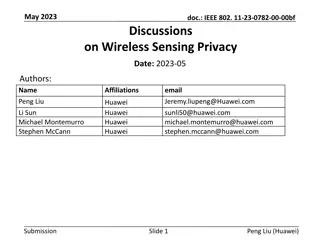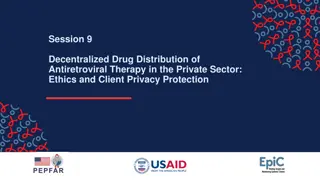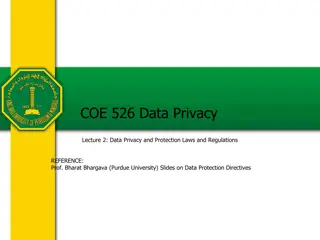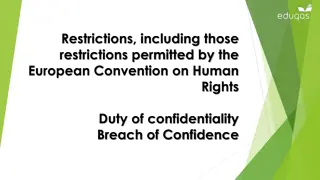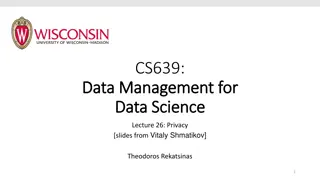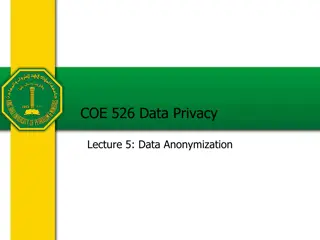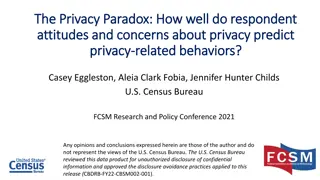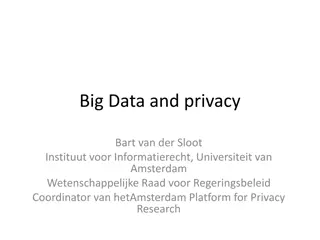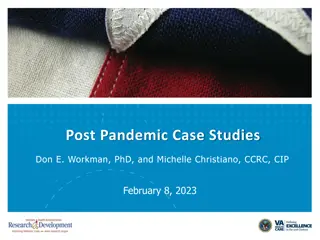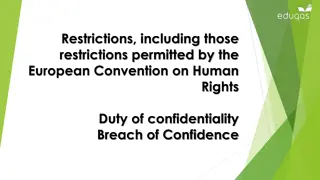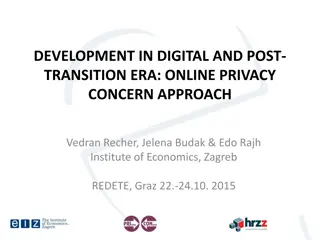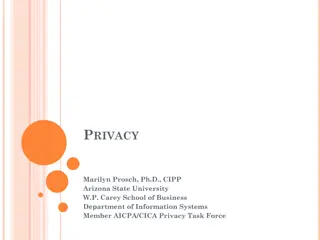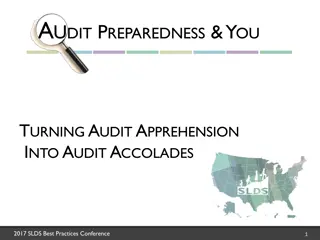Understanding VA Privacy Issues and Sensitive Information
Explore the complex landscape of VA privacy issues, including data relationships, sensitive personal information (SPI), personally identifiable information (PII), individually identifiable information (III), and individually identifiable health information (IIHI). Learn about the roles and responsibilities of privacy officers in handling research protocol reviews and central privacy assessments.
Download Presentation

Please find below an Image/Link to download the presentation.
The content on the website is provided AS IS for your information and personal use only. It may not be sold, licensed, or shared on other websites without obtaining consent from the author. Download presentation by click this link. If you encounter any issues during the download, it is possible that the publisher has removed the file from their server.
E N D
Presentation Transcript
VHA Privacy Issues and Privacy Reviews Stephania Griffin, JD, RHIA Director, Information Access and Privacy Veterans Health Administration Office of Health Informatics Michelle Christiano, CCRC, CIP Privacy Officer Veterans Health Administration Office of Research & Development February 2023 1
Privacy Topics Data Types and their Interactions Privacy Officers Roles/Responsibilities Privacy Officer Review Documentation Privacy Officers Process for Research Protocol Reviews with Commercial IRBs Central Privacy Reviews 2
Data Relationships SPI/PII III IIHI PHI* LDS De-identified Data 3
Sensitive Personal Information (SPI)/ Personally Identifiable Information (PII) SPI with respect to an individual means any information about the individual maintained by an agency, including the following: a. Education, financial transactions, medical history, and criminal or employment history b. Information that can be used to distinguish or trace the individual s identity, including name, social security number, date and place of birth, mother s maiden name, or biometric records 4
Sensitive Personal Information (SPI)/ Personally Identifiable Information (PII) SPI/PII is a subset of VA Sensitive Information/Data and may also include: Individually Identifiable Information (III) Individually Identifiable Health Information (IIHI) Protected Health Information (PHI) Limited Data Set (LDS) Non-Identifiable Information (NII) 5
Individually-Identifiable Information (III) III is any information pertaining to an individual that is retrieved by the individual s name or other unique identifier It is a subset of Personally Identifiable Information (PII) that is always protected by the Privacy Act and does not have to be health information. 6
Individually Identifiable Health Information Individually-identifiable health information (IIHI) is a subset of health information, including demographic information collected from an individual, that: (1) is created or received by a health care provider, health plan, or health care clearinghouse (e.g., a HIPAA- covered entity, such as VHA); (2) relates to the past, present, or future physical or mental condition of an individual, or provision of or payment for health care to an individual; and (3) identifies the individual or where a reasonable basis exists to believe the information can be used to identify the individual. 7
Individually-Identifiable Information (III) IIHI is a subset of health information and a form of Individually Identifiable Information (III) in the possession of VHA and protected by the HIPAA Privacy Rule, Privacy Act, 38 U.S.C. 5701 and, when applicable, 38 U.S.C. 7332 8
Protected Health Information (PHI) PHI is IIHI transmitted or maintained in any form or medium by VHA, as a health plan or covered health care provider, that has not been de-identified in accordance with the HIPAA Privacy Rule. 38 U.S.C. 7332-protected information is a subset off IIHI that is health information related to: HIV; Sickle cell anemia; and/or the treatment of drug abuse, alcoholism or alcohol abuse. 9
Limited Data Set (LDS) LDS is a subset of PHI from which certain specified direct identifiers of the individuals and their relatives, household members and employers have been removed, but is not de- identified. Includes name, address (other than town or city, state, or zip code), phone number, fax number, email address, Social Security Number (SSN), medical record number, health plan number, account number, certificate or license numbers, vehicle identification, device identifiers, web universal resource locators (URL), internet protocol (IP) address numbers, biometric identifiers, and full-face photographic images The two identifiers that can be used are dates and postal address information that is limited to town or city, State, or zip code. 10
Non-Identifiable Information (NII) Non-identifiable information is III from which all unique identifiers have been removed so that the information is no longer protected under the Privacy Act, 38 U.S.C. 5701 or 7332. Non-identifiable information that is health information is still protected under the HIPAA Privacy Rule as it is not de-identified by either Safe Harbor or Expert Determination. 11
De-identified Information De-identified information is not considered Sensitive Personal Information It is health information that is presumed not to identify an individual and there is no reasonable basis to believe that the information can be used to identify an individual, because the 18 patient identifiers described in the HIPAA Privacy Rule have been removed by one of the following two methods: Safe Harbor, or Expert Determination 12
De-identification Methods HIPAA Privacy Rule De-identification Methods Expert Safe Harbor 164.514(b)2 Determination 164.514(b)(1) Apply statistical or scientific principles Removal of 18 types of identifiers No actual knowledge residual information can identify individual Very small risk that anticipated recipient could identify individual 13
De-identified Information De-identified information is no longer covered by the Privacy Act, 38 U.S.C. 5701 or 7332, the HIPAA Privacy Rule and is no longer considered personally identifiable information. FOIA may apply to requests for the disclosure of de-identified data. (NOTE: FOIA is not a data protection law but a date disclosure law.) 14
Coded Data Coded Data means a random or arbitrary alphanumeric code or symbol used in place of unique identifiers. Coded data is NOT generally de-identified. The code is often used to segregate one record from another. However, when that code is used to link data on a research subject through time, it becomes a unique identifier, and the data is not de- identified. For example, Study ID. The coded data would still be protected health information under the HIPAA Privacy Rule. 15
Coded Data Even when coded data does not use a code to link multiple data collections to a subject s record, the information may still be a Limited Data Set (LDS) as opposed to de-identified data. All dates associated with the subject or the subject s family and address information limited to city, state and zip code are permitted. A LDS is still protected health information that must be protected under the HIPAA Privacy Rule. 16
Documenting Privacy Reviews CIRB Privacy reviews are documented via the Form 123 Field Privacy Reviews are documented by the VA Form 10-250, VHA Research Protocol Privacy Review Checklist, is required by VHA Directive 1605.03 Both the Preliminary and Final review sections must be completed. Must incorporate applicable completed form into the protocol documents. May be maintained in facility protocol documentation, if using Affiliate IRB.
Why Not Use the Same Form? The processes for PO interaction with the research team is different at the Central level than it is at the facility level. Multiple sites require a higher level review. 19
Completing VA Form 10-250 Privacy Officer Preliminary review begins on pg. 2 Conducted to ensure that all privacy concerns are addressed prior to approval Privacy Officer Final Review begins on pg. 5 Conduct a final review after the IRB (or R&D Committee when acting as Privacy Board) has approved the study to see if any changes were made that would affect the privacy interest of the subjects Did the approval documents include all the necessary components
VA Form 10-250 When should this form be initiated by the Principal Investigator? New submission Continuing Review or Amendment/Modification that have a privacy impact (e.g., changes to the VA Form 10-0493, change in data sources, etc.) 21
VA Studies Permitted to Use Commercial IRBs Courtesy of Dr. Karen Jeans, Office of Research Protections, Policy, and Education (ORPP&E), VHA Office of Research & Development Use of a commercial IRB is not appropriate for all VA studies, and VA policy does not allow the use of a commercial IRB for all studies. VA Facilities are not permitted to use commercial IRBs as their primary IRBs of Record. VA studies may use a commercial IRB if it meets all of the following requirements: Multi-site research At least one VA is participating as a site in the study Neither VA nor the VA Nonprofit Corporation (NPC) is not contracting directly for use of the commercial IRB for the study (e.g., another party is paying for the use of the commercial IRB). ORD has approved the use of the commercial IRB for applicable VA studies.
Commercial IRBs Permitted to be Used by VA Facilities Courtesy of Dr. Don Workman, Office of Research Protections, Policy, and Education (ORPP&E), VHA Office of Research & Development VA has agreements with three commercial IRBs at the present time Advarra IRB: 82 VA Facilities Western Institutional Review Board (WIRB)-Copernicus Group (WCG) 76 VA Facilities Sterling IRB 12 VA Facilities VA anticipates that additional commercial IRBs will be approved in the future if they meet VA s requirements.
Local PO Process for Commercial IRB Submissions Local PO is to review the submission the same as for any external IRB submission The PO may have to reach out to the research team for questions via email or Project Mail in VAIRRS as each of the commercial IRBs have different forms E.g., Advarra does not ask for the identifiers 24
Central Privacy Reviews Central Privacy Reviews are only conducted by the ORD, Privacy Officer for projects that are multi-site, reviewed by a single commercial IRB and that are managed by the: Partnered Research Program (PRP) ACTIV Network There are currently five studies with a combined total of 34 VA facilities. 25
FAQ What statutes apply when VHA employees (providers, nurses, etc.) are research subjects? Who confirms that the data are de-identified before the data is disclosed? 26
ADDITIONAL INFORMATION Stephania Griffin, Director Information Access and Privacy (105HIG) 704-245-2492 Stephania.griffin@va.gov VHA Privacy Office email contact: VHAPrivIssues@va.gov 28
ADDITIONAL INFORMATION Michelle Christiano, ORD Privacy Officer 706-399-7980 Michelle.Christiano@va.gov 29
